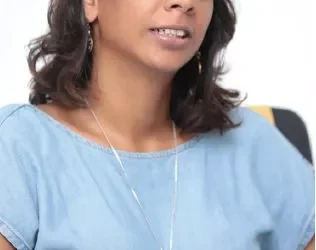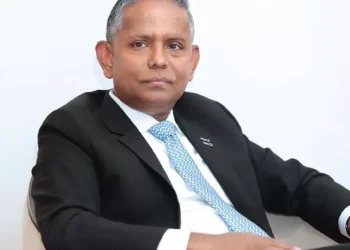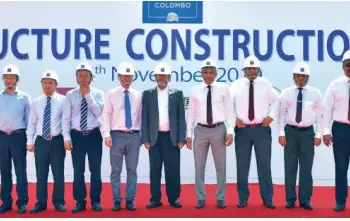
lk86Milinda Moraogda (MM) discusses the latest global issues and their relevance to Sri Lanka with Yasushi Akashi (YA), Senior Japanese Diplomat, UN Administrator and Former Japanese special envoy to Sri Lanka in this episode of ‘In Black & White’. The program is telecast on TV One (MTV) every alternating Sunday.
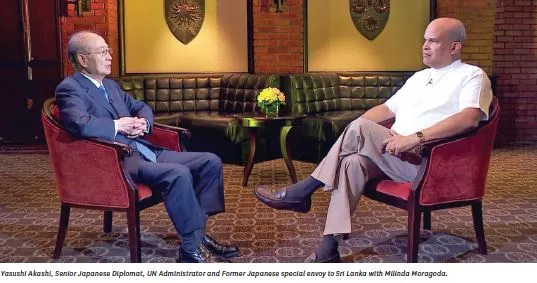
MM: Ambassador Akashi, welcome. Your career has spanned most of the 20th century. Starting with the Second World War, you saw the Cold War and its conclusion, and now we are facing a different kind of turmoil. I would like to talk about that whole journey, as both an interna-tional diplomat, and Japan’s most respected diplomat.
YA: It was not something that was carefully prepared and planned. On the contrary, I stum-bled into it. The end of the Second World War came in 1945. I was then 15 years old. My gen-eration of the young Japanese was confused and bewildered by Japan’s surrender to the allied powers, more particularly, to the United States. We were shaken by such an event. That could not have happened if you believed that Japan was invincible. And my generation of Japanese had been trained to believe in the mythology of the invincibility of Japan. We were shaken to the ground and in came all kinds of ideas, thoughts, and ideologies once the Marxists who had been in prison had been liberated. They started to teach us about the glories of communism. Others taught us about how wonderful liberalism and democ-racy are. There was a period of utter confusion.
Fortunately for Americans, they knew the pros and the merits of democracy and some of them, of course, taught us that democracy can solve anything. But in reality, as you know, it can not. We were confused by all kinds of ideas and ideologies. I decided to study about American political institutions. I wrote my bachelor thesis at the University of Tokyo about Thomas Jefferson and his political philosophy. Later, I had the opportunity of studying in the United States.
MM: At the Fletcher School, was it?
YA: The Fletcher School; but before going to the Fletcher School, I went to the University of Virginia, which was founded by Thomas Jefferson himself. Jefferson was an enigma; on the one hand, he preached the Declaration of Independence and all the glories of American democracy, but he was a slave owner – he had about 20 slaves.
Democracy itself has a somewhat mythology about it. But I was very much struck by three American politicians – Franklin, James Madison, and Alexander Hamilton. These people firmly believed in the Americans, on preventing dicta-torships from emerging. They knew that when you give too much power, that power corrupts.
In the case of America, you have the Congress, which is elected by the people at large; the President, who is the head of the executive branch; and a third branch, which is the Supreme Court. And they checkmate each other. That prevents dictatorships from emerging. There’s a wisdom in it. As Winston Churchill said, democracy is the worst form of government, except all others. I think there’s a lot of truth in this rather ironical statement.
MM: Then how did you get involved in diplomacy? After you came back from the United States, what did you do?
YA: In fact, while in the United States, I went from the University of Virginia to the Fletcher School of Law and Diplomacy, which is a small graduate school.
MM: After University?
YA: Yes, for diplomats. And in between, I at-tended an international summer camp, where I was suddenly called upon to make a speech about the political situation in East Asia. Which I did without much preparation. There was a British diplomat and a scholar, who was a Director at the UN Secretariat. For some reason, he was impressed with what I had to say and he asked me, I think he said, “Japan’s admission to the UN is imminent and we will be looking for a Political Affairs Officer from Japan. Would you like to apply for it?”
I had no idea what he meant. I just wanted to become a scholar, and a researcher about international politics, so that Japan will not repeat our mistakes of the past.
MM: Was this in the 1950s?
YA: I was at the Fletcher School in 1955 – 56. There was a professor of mine from MIT who – somehow, he commended me as a good student. There were other applications, but for some reason which I don’t understand, I was chosen. I still do not understand why I was chosen. But I was receptive to all kinds of ideas and stories. I wanted to have an open mind in order to not make the same mistakes as some Japanese po-litical and diplomatic leaders did during the Second World War. Thereafter, I accepted this job at the UN.
MM: You would have been in your late twenties?
YA: Yes, I was 26 years old. I was a very eager beaver for any good analysis of international and diplomatic stories. There was power politics which was in vogue, Hans Morgenthau’s story was very rampant in those days. I was very recep-tive to all kinds of things. And I was permitted to take some graduate courses at Columbia University and I was very eager to learn what goes on at the UN.
There are always simplistic theories to explain clearly what’s behind complicated diplomacy in the world. I came to find that, yes, there’s a lot of truth, that what is at work is power, power-hungriness and a lot of self-interest or what you call national interest. But behind all these, there’s also a degree of idealism and morals repre-sented by some of the leaders at the UN, like Dag Hammarskjöld, second Secretary-General of the UN, and Lester Pearson who was the Canadian Foreign Minister during the Suez Canal crisis in 1956. Hammarskjöld and Pearson together devised the UN Emergency Force, even though the UN Charter mentions no UN Emergency Force.
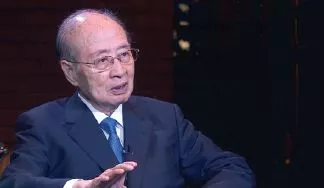
MM: They were able to interpret the idea.
YA: It was a product of practical need. Therefore, these two sought for emergency forces. They felt that it had to be created through a General Assembly resolution, which they did. There is a large degree of real politics, political manoeuvres, and egoism – but there is a smaller, nevertheless existing idealism, which tries to make this world a better place to live.
MM: If you look at Japan’s contribution, not in the financial sense, but through this ideal that you are referencing to – what would Japan’s contribution have been? Is there a special con-tribution that Japan has made to international vision?
YA: I like to think so. But pragmatic grown-ups tend to scorn good ideas. They tend to be very cynical about all these events. What you need is a small, determined minority of people. Japan became a member of the UN in December 1956. Soon afterward, Japan started its activities. As you know, during the League of Nations days, Japan was one of the major powers, but Japan did not do much except to invade China and make Korea a colony of Japan.
Of course, Japan paid reparations to make up for the damages to the neighboring countries. But there were those Japanese who thought Japan should do something more prominent. Within the limitations of Japan’s new constitution, we felt very strongly that Japan should respond to the British Empire, people like Dag Hammarskjöld and Lester Pearson. And we advocated Japan taking a more active part in all types of UN peacekeeping in the world.
It was rather ironic that the data in the 90s – after the end of the Cold War – there were new horizons that were open for countries like Japan, Germany, Canada, and a few other countries. We felt that with a small mobile force that intervenes between conflicting parties, you can do a lot to save the world from becoming a great danger to humanity as a whole.
MM: if you were to assess that concept – a small mobile force that can intervene in a very stra-tegic way – how successful has it been when you look at it today?
YA: A good question. We were not as successful as some of us might claim. But we were not unsuc-cessful either. What the UN does and does not do is usually beyond what we can do apart. I think the UN is not as strong as our world government and our world federation, but, it’s beyond – it’s more than our collection of sovereign govern-ments. It’s somewhere in between.
Therefore, this small mobile and unarmed or lightly armed police forces have been sent to the Middle East, to Africa, and some parts of Asia with several diplomatic positive results. There is a hardcore of supporters for the light UN forces which is still present between India and Pakistan, in Kashmir, the Middle East, between Arab and Israel and in about eight or nine African countries – half of which have rather heavily armed military personnel between different Islamic communities -so that they will not come in conflict with each other.
MM: I know you are quite involved with peace-keeping in the UN. What are the lessons to be learned from that model if you were assessing it today?
YA: There are positive lessons. There are also negative lessons. The UN was very successful in Cambodia, where after 20 years of incessant conflict, we were able to separate the forces. Three of the four major parties joined the UN to safeguard free and fair elections under the UN supervision. Despite all kinds of challenges by the so-called Khmer Rouge, we were able to carry out elections and the result was a democratic government with ninety percent of participation by the voters in Cambodia.
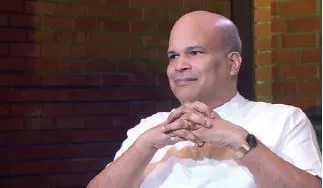
Similar success was reached in Mozambique, Namibia, and other places. But we experienced an unfortunate story in Somalia. The UN was outnumbered by the faction of Aidid and had to withdraw – particularly after casualties were experienced by us, to the American Marines and Pakistani forces. Therefore, we had to withdraw from Somalia, in Rwanda when the Tutsi minority people were killed by the Hutus, who are in the majority. The UN had about 300 peacekeepers only. We were outnumbered and unfortunately, we were witnesses to the half a million deaths experienced by the minority people.
MM: Today probably the UN faces the biggest challenge, maybe since it was founded. There is – almost a school of thinking among powerful countries. Especially the United States some-times questions its relevance. In your view, what is the future of the UN? Does it need reform and if so, what kind of reform does it need?
YA: I think, Milinda, that we should not think of easy solutions. If we try to impose so-called artificial solutions to the UN to strengthen it, we will find ourselves in great trouble. The interna-tional community is not a real community, yes. But of course, national border lines are becoming lower and more people in the world come to think alike. And this is a big hope for all of us. But we are still far from it and we have to build up from small results to more significant, larger results. Let’s not be perfectionists. But we should go beyond the modest results we have achieved so far. Lots of things are yet to be done, but like-minded people in the world should try to work together.
MM: Even in the current situation where interna-tionalism is looked down upon in many countries, because nationalism is resurgent. Do you still think there is hope?
YA: I think so. It’s not just the dream of, you know, better days to come. We have to work hard so that we can build upon positive results. Let’s start from small, modest successes and learn our les-sons from our mistakes. We should try to work together with people from other countries and other cultures, so there’s no reason for us to despair of what we might be able to achieve.
MM: Does Japan have a special role in this trans-formation?
YA: Yes, so do many other countries in the world. Sri Lanka and the others as well.
MM: We are coming to the end of the program. We haven’t spoken at all about Sri Lanka, which has been very much a part of your interest. You also had an association with Sri Lanka for 15 years, starting with the peace process in 2001. What is the message you have for Sri Lankans in the context of the new world as it is emerging?
YA: Sri Lanka is a small but beautiful island country. Very well located. People are anxious to visit Sri Lanka. But it is a nation – quite above Islamic and the religious communities. It’s not a homogenous country, but you have several Islamic communities, cultural communities who are running constantly together. You have been achieving successes, but there have been disap-pointments.
I try to tell Sri Lankan people they have so much that they have already achieved, and they should continue to build up a small relationship so that they will become larger and more durable. I know a lot of good people in Sri Lanka are work-ing very hard and they can also inspire others to do likewise. Let’s not despair of what we cannot do today, but let’s continue to build from small interpersonal relationships to something larger.
MM: Thank you, Ambassador Akashi, for that very encouraging and not idealistic piece of advice. Thank you very much for joining us.
YA: Thank you very much.


